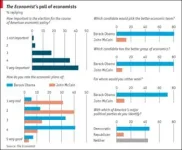Platypus said:
The truth is that economists prefer much more liberal policies that most Americans. ... Do you really think you know more about economics than the majority of people who have devoted much of their life to studying it?
There is a very valid reason for the large numbers of economists who classify themselves as Democratically aligned politically but a thorough explanation would take far longer than I am willing to go into. For the Cliff-notes version you will need to set aside your biases and consider the following:
- Economics itself is supposed to be neutral just as every other science alleges to be. Unfortunately, humans are prone to biases and incentives which have the tendency to affect the opinions and studies performed by scientists. A perfect example would be the great consternation over global warming. There is ample evidence which shows that a delay in any significant actions in response to global warming is advised until a more in-depth study can be performed. However, there is an
enormous amount of money to be made by scientists who support the man-made/Al Gore model of global warming which tends to skew results of tests. The same sort of political influences exist within the field of economics. In other words, there is a lot of money to be made by economists who suggest that the government is in a position to fix the problems of the economy.
- Economics itself is far from an agreed upon science. Most people will point to Adam Smith as the founder of modern economics when in reality he set the field back a few hundred years at best and sent the focus down a rabbit hole of problems which had already been solved. Today, the vast majority of economists have been educated based upon various "flavors" of Adam Smith's doctrines. The most powerful/popular schools of economic thought today are Marxist, Keynesian, and Chicago (Monetarist), with the Austrian school regaining popularity with the emergence of lost knowledge. The first three, which make up probably 95% of the major universities throughout the world, all believe that government intervention may be and
should be used as a key policy measure for a successful economy. Only the Austrian school shows the negative effects of all government intervention.
- Because the major tenets of the foundational economic ideology within mainstream economics encourages government intervention, it is a simple step forward to find the sorts of economists who push policies which support this sort of intervention. Until recently the Democratic party was the ideal political platform for this since the Republican party pushed for a limited government. Obviously this is no longer the case and we can see a rise in the numbers of economists who consider themselves as Republican within the last 30 years or so as that party becomes more in favor of government largesse.
The fact is, economics is easy. It is completely unnecessary to devote your entire life to study its innermost secrets because they do not exist. Sure, there are many nuances and finer theories which require dedication and study but the basic foundations of economics are supremely simple. For the simple fact that you know how much you would pay for a particular item at any given point in time gives you the expertise necessary to show that top-down planning of an economy is not only impossible but detrimental to the success and happiness of everyone.

